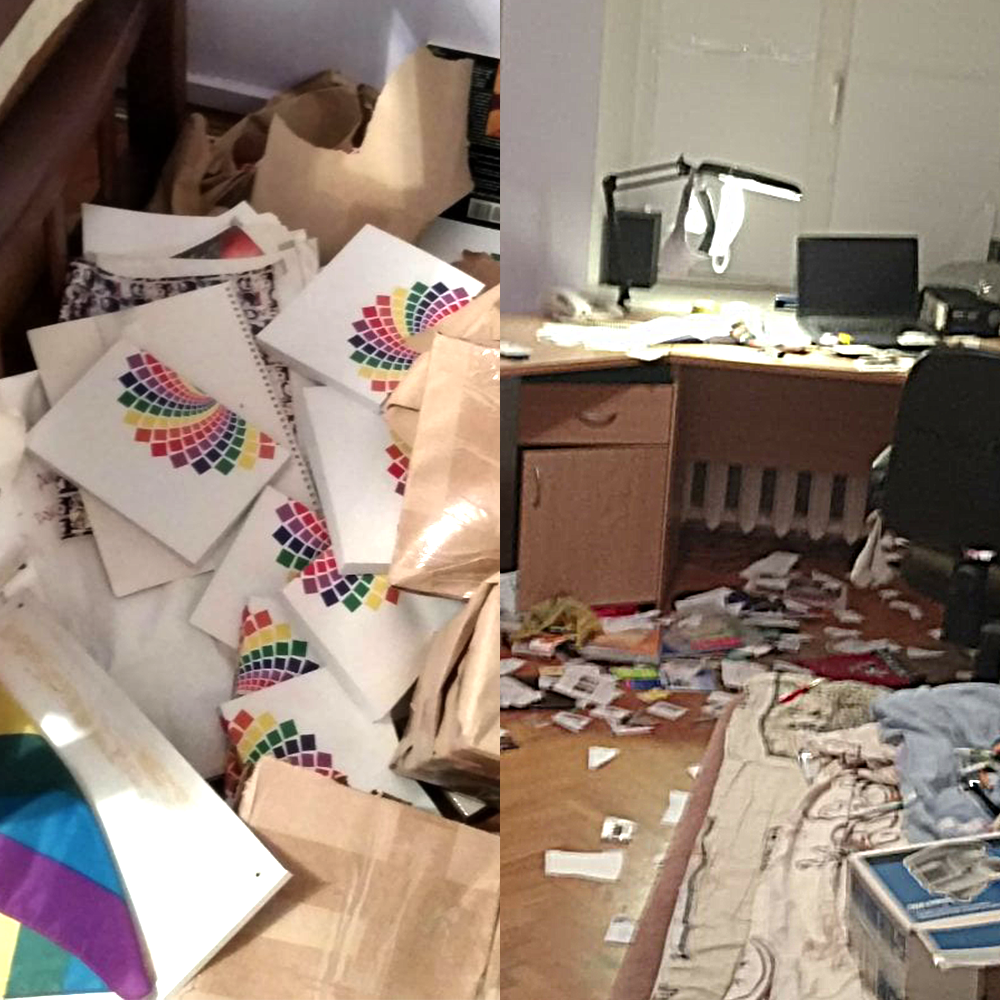Putin has consistently portrayed himself — and by extension, Russia — as a staunch defender of traditional family values in order to create a distinct identity against the so-called decadent, liberal West. In particular, Europe — or “Gayropa,” as it is commonly referred to — is seen as a place of immorality and debauchery with values from which Russia must protect itself and its pan-Slavic brothers. Consequently, this anti-LGBTI rhetoric has had a strong influence in Eastern Ukraine, where much of the Russian propaganda has been based on the narrative that Ukraine needs to be rescued from the threats “Gayropa” poses to a traditional, Orthodox way of life.
Accordingly, various strands of this discourse have also emerged in the recent conflict. For example, in a sermon on 6 March, the head of Russia’s Orthodox Church appeared to blame liberal Western values for Russia’s invasion of Ukraine. Putting particular emphasis on gay pride parades, Patriarch Kirill characterized them as a “loyalty test” to the West.
“Pride parades are designed to demonstrate that sin is one variation of human behavior. That’s why in order to join the club of those countries, you have to have a gay pride parade.”
Kirill further claimed that citizens of Ukraine’s breakaway republics — the Luhansk and Donetsk People’s Republics — were sacrificing themselves to fundamentally reject these so-called values.
As the war continues, there is a high likelihood that this narrative will persist in Russian propaganda and continue to influence the local population, leading to increased targeted violence against these communities. Some effects of this rhetoric have already become visible, the most prominent example being the anonymous attack on the Nash Mir (“Our World”) LGBT Human Rights Center. On 1 March, Nash Mir Coordinator Andriy Maymulakhin notified supporters in an email that “some unknown people broke [the] door in our office in Kyiv” where four of his colleagues were living and “brutally beat and robbed [them].”
“We do not know who they are,” Maymulakhin said, noting that the assailants had guns. “They humiliated my friends. They are bandits.”
While his colleagues have since been relocated to a shelter in Kyiv, Maymulakhin emphasized that it is almost impossible to leave the capital city and that he did not know how people could help in this situation other than to “demand from your government to help Ukraine to resist in this terrible time.”
While Ukraine never ranked high in terms of protecting LGBTI rights, many in the LGBTI community recognize that much of the progress they have successfully fought for would disappear under a Russian-backed regime. One has only to look at the backsliding that occurred in Crimea following the Russian annexation of the territory in 2014 — today, there are effectively no LGBTI organizations operating, and the LGBTI community remaining has gone underground. The fear of this future has led to many LGBTI Ukrainians signing up as combat volunteers, training as paramedics, or otherwise helping on the frontline.
There are different concerns for those LGBTI Ukrainians who have been left as refugees. One of the most significant issues is concerning the reception they will receive in their new host countries. A 2021 United Nations report states that LGBTI refugees have a high risk of discrimination and recurring human rights violations throughout their displacement cycle. The situation for LGBTI Ukrainians is no different, especially given the lack of LGBTI rights in the countries accepting the most Ukrainian refugees. The majority of Ukrainians — over 1.2 million — have fled to neighboring Poland, a state with strong anti-gay laws and rhetoric. Another 200,000 have reached Hungary, which has been consistently backsliding in recent years in regards to LGBTI rights. While no cases of discrimination or violence have been reported yet, activists on the ground say they are concerned that the fear of potential prejudice will lead many LGBTI refugees to move on to other states with friendlier laws.
For trans women and non-binary people, there is an additional barrier to first crossing the border: the order that all men ages 18-60 remain in the country. Although technically eligible for a medical exemption, many trans women and non-binary people are blocked at border crossings because their government IDs still mark them as male. Mismatching identification documents could also lead to denial of service to food banks, shelters, and other bare essentials, which often require a valid identity card.
Another issue affecting the community is access to critical medical supplies, including HIV medication and hormone replacement therapy, the disruption of which can have severe health consequences. In an interview with Pride Source, the executive director of KyivPride Lenny Emson explained that pharmacies in Ukraine are mostly out of stock, leaving the population reliant on donations from abroad. As more and more cities are put under siege, it will become harder and harder for LGBTI Ukrainians to get the provisions they need.
At the moment, the international community — among them numerous LGBTI organizations and activists — has responded as never before, providing critical aid and assistance to LGBTI Ukrainians. However, this attention will likely wane as the war continues, as history as shown happen time and time again as people tire of seeing negativity. In this case, it will be a long road ahead for LGBTI Ukrainians, whether they have stayed in Ukraine or fled abroad.
Alturi has partnered with Prague Pride to help Ukrainian LGBTI refugees find shelter in the Czech Republic and financially support Ukrainian LGBTI organizations while they are still able to operate. You can find a list of other organizations working to aid LGBTI Ukrainians here.

